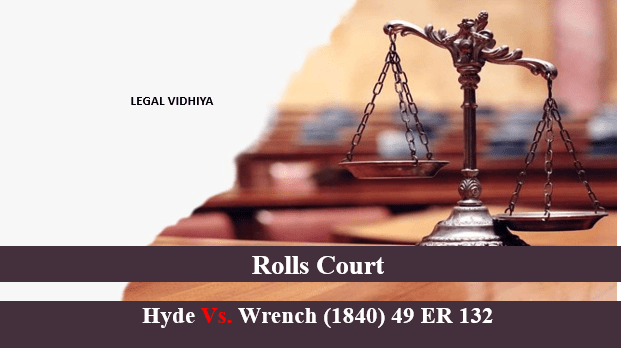
| Citation | Hyde v Wrench [1840] EWHC Ch J90 (08 December 1840) |
| Date of Judgement | 8th December 1840 |
| Court | Rolls Court |
| Appellant | Hyde |
| Respondent | Wrench |
| Judge(s) Sitting | Lord Langdale |
FACTS
The defendant, Mr Wrench, offered to sell his land located in Luddenham to the plaintiff, Hyde. He offered £1,200 for the house through one of his agents. But Mr Hyde declined the proposal via his agent. The defendant decided to write to the plaintiff again on 6th June 1840, this time offering him £1,000 for the farm stating that it was a final offer. He got clear that this would be his final bid for the property. Also, He will consider another candidate if the money is not in the bank by Michaelmas, whenever the estate will be free of taxes, etc. Mr Hyde rejected his offer and instead offered the sum of £950 for the land in the note of return. Mr Wrench declined, as he confirmed in the lawsuit. Mr. Hyde then consented to buy the farm for the originally brokered £1,000 price. Mr Wrench, on the contrary hand, was passionate about not selling his farm. As a result of this, he filed a lawsuit over him, demanding specific contract performance. The plaintiff argues that the offer was not revoked prior to acceptance, and thus the transaction was completed.
ISSUES
- Was the contract valid between the parties?
- Was a counteroffer made?
- Was a breach of contract committed by Wrench when he refused to sell the farm to Hyde?
- Was the original offer still valid?
ARGUMENTS
While Mr. Pemberton and Mr. Freeling, showing up as attorneys of the plaintiff, argued that since the defendant’s offer hadn’t been withdrawn before to the plaintiff’s authorization, the plaintiff was knowledgeable about accepting the defendant’s offer as long as it continued and the defendant wasn’t taken stunned by it. They argue that in so far as a proposal is not retracted, the plaintiff has the authority to take it.
Defendant proposed selling it for £1000, and if the offer was indeed accepted instantly and undoubtedly, there should have been a surely enforceable contract; rather, Plaintiff presented his offer to buy the property for £950 and consequently rejected Defendant’s original offer.
JUDGEMENT
After weighing the explanations and facts presented, it was determined that an unambiguous acceptance was necessary to form a contract that is enforceable. On June 6, the plaintiff dismissed the 1000-pound offer and made a counter-proposal. The defendant subsequently denied this in a letter dated the 27th of June, with no rebuttal or fresh proposal made within the letter. As a result of this, the plaintiff was unable to accept any offer.
Consequently, the allegations made by the plaintiff were overruled and the case settled in favor of the defendant. Since there was no binding contract between Hyde and Wrench, the defendant was not forced to carry out the deal.
REFERENCES
All Answers ltd, ‘Hyde v Wrench – 1840’ (Lawteacher.net, September 2023) https://www.lawteacher.net/cases/hyde-v-wrench.php?vref=1 ( accessed 3 September 2023)
Written by Monal an intern under legal vidhiya.




0 Comments